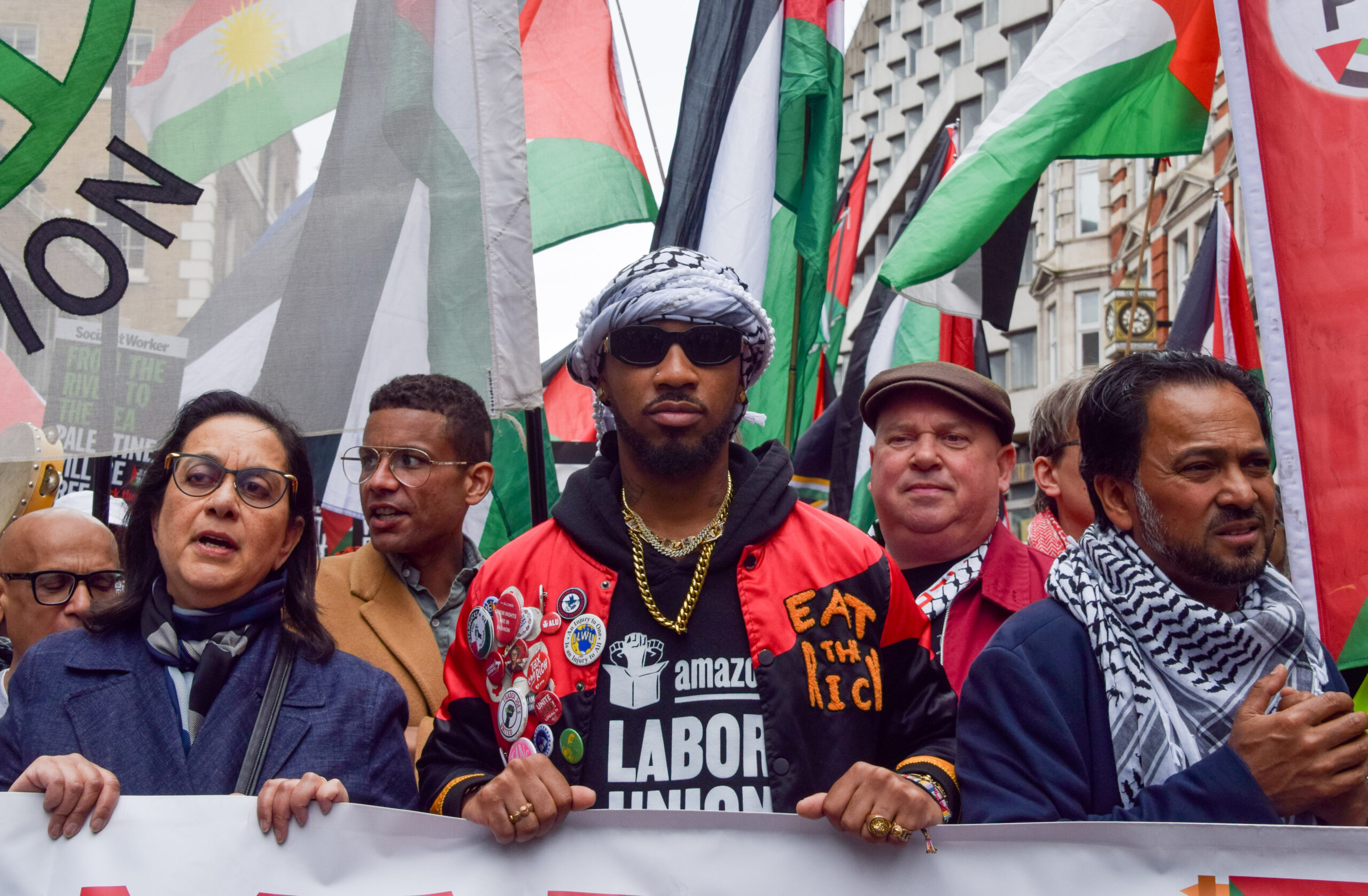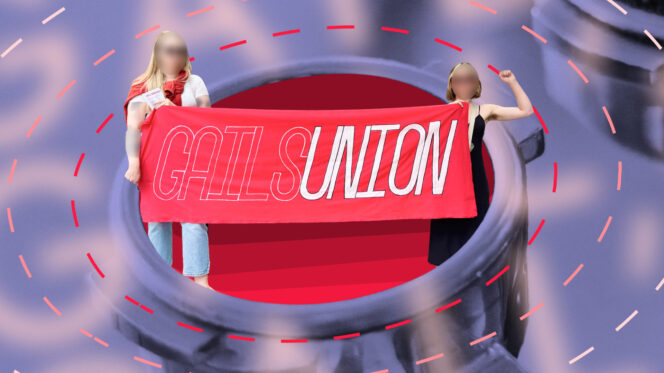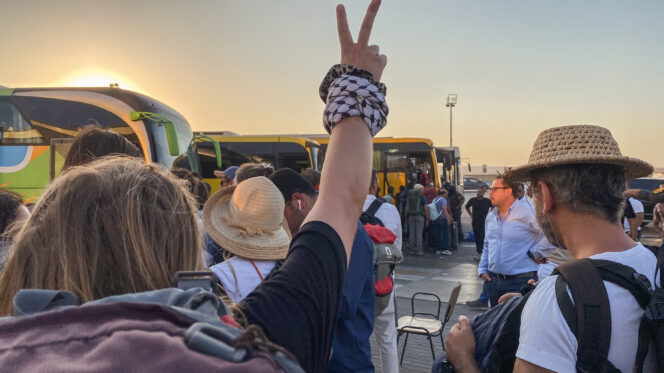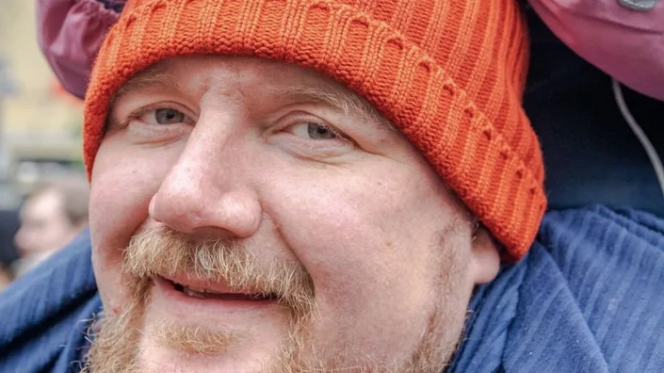Ex-Amazon Union Leader Says US Trade Unions Are Complicit in Gaza Genocide

In 2022, Chris Smalls found himself the face of the US labour movement after leading the first successful union drive at a US Amazon warehouse. He’d co-founded the union two years earlier, after he’d been fired for leading a walkout over Covid-19 safety concerns. His fight against the billionaire Jeff Bezos made him international news.
Since he’s taken up Palestine activism, Smalls says that’s changed.
On 13 July, Smalls joined the Gaza Freedom Flotilla (GFF)’s most recent mission to break Israel’s siege of the strip, boarding the Handala alongside 20 other activists, politicians and journalists. The ship, which carried food, baby formula, and medicine, shared the fate of all but five GFF voyages: it was intercepted and boarded by the Israeli Defence Forces on 26 July.
The IDF took 21 of those aboard into custody. During that time, Smalls says Israeli soldiers beat and choked him. Smalls – the only Black person aboard the ship – was the only Handala crew member to report being physically abused by Israeli soldiers while in detention.
The union leader’s arrest and beating have passed with hardly a murmur from either the mainstream press, and only isolated outrage from the American labour movement. I spoke to Chris over Zoom, 17 days after he returned home, about his journey aboard the Handala, the intersection of the labour movement and the Palestinian struggle, which he has elsewhere described as a “working-class issue”. The interview has been edited for clarity and length.
Polly Smythe: How did you get involved with the Palestine solidarity movement?
Chris Smalls: Before 7 October, I was privileged enough to do a panel discussion with [PLO council member and general secretary of the Palestinian National Initiative] Dr Mustafa Barghouti, where he laid out Palestine’s history since the first Nakba. He invited me to come visit him in Palestine one day, and I agreed.
On the week of 7 October, I was in Berlin, which has one of the largest Palestinian communities outside of Palestine. They have about 30,000 to 40,000 residents [Germany does not include people of Palestinian origin in its demographic data, however in 2022 the Palestinian Diplomatic Mission in Berlin estimated that there were over 100,000 people of Palestinian descent living in Germany]. I saw with my own two eyes how the police responded to that community: setting up paddy wagon bands; arresting anybody with a flag or who was saying “free Palestine”; even dragging children away from their parents and arresting them. I couldn’t just turn my back on what I’d seen.
When I came home and started speaking out about that experience, I lost tens of thousands of followers, and a lot of opportunities were taken away from me. That’s when I realised that this was the same type of attack I experienced when I took on Amazon … people saying negative things and not believing in the fact that we can take on this company and win. That’s what made me go even harder.
From that moment forward, I’ve joined in with many protests in the US. I was at the Columbia University encampments from day one, and I’ve travelled to different encampments across the country and the world. I want to use my platform to amplify Palestinian liberation.
How did you come to be aboard the Handala?
I knew some of the activists before, but not personally … I was able to reach out to [Kurdish activist] Yasmine [Acar] from Germany. With everything [the crew] were dealing with, they couldn’t worry about who’d be the next person on a flotilla at that moment, so I didn’t hear back until pretty much the day before I left. I reached out to a journalist, [who] put me in contact with Huwaida Arraf, the co-founder of the Freedom Flotilla Coalition. I was told that if I wanted to be on the mission, I should leave tomorrow. I didn’t even hesitate.
Could you talk about your experience on the flotilla?
The boat was made in 1968. There were 21 volunteers, and with all of us on board, it was tight, but we made it work. We built a really strong bond, and we were always uplifting one another. We all had chores every day … and a meeting twice a day. We had a really good morale, but with seven days sailing on the Mediterranean, you had to battle sea sickness … aches and pains.
Even though I was assaulted by the authorities, I knew that my fellow crew members were right there. They were screaming: “Where’s Chris?” Even when we were in prison, where conditions were worse, the six or seven other men that I was locked up with, we all kept our spirits up. We talked every day about getting home to our families. Because we were on a hunger strike, we spoke about the type of food we wanted to eat.
As a Black man, I knew I was going to be treated more harshly than the others. Everybody knew that I was one of the most vulnerable, so they tried to protect me as much as possible … It’s no coincidence that I was one of the last to leave, and not only that, [Israel] dropped me off at the border of Jordan, while everybody else was taken to Tel Aviv airport. Everything they did from the beginning to the end was racially motivated.
Explain how you understand the connections between the struggle at Amazon and the struggle against the genocide.
Amazon is more than complicit [in Gaza]. It is participating actively in the surveillance and the targeting of innocent Palestinians every day. Not only that, Amazon Web Services (AWS) is the military industrial complex intelligence, and that includes Israel’s Iron Dome as well [Amazon Web Services supplies Israeli state-owned defence company Rafael, which sells the Iron Dome rocket-defence system]. Amazon invested $7.2bn into Project Nimbus, along with other corporations like Google and Meta [in 2021, Amazon won a $1.2bn (£900m) contract on Project Nimbus, Israel’s cloud computing project. In 2023, Amazon announced it was planning to invest a further $7.2bn (£530m) in Israel through to 2037]. The initiative is to create a project where they use artificial intelligence to track down innocent people. That’s the connection between Amazon and the genocide.
In America, Amazon has government contracts with the Pentagon worth billions of dollars. Most people think that if you boycott Amazon in the retail section, that’s going to hurt them. But it’s actually not, because AWS is their main source of revenue [in 2024, AWS accounted for just 15% of the company’s revenue, ie its total takings before expenses, but 50% of operating income, its revenue minus expenses].
As a labour leader, I felt it was important for me to not only connect the dots between Amazon [and Gaza] but also to apply pressure to other labour unions, as well as the AFL-CIO [The American Federation of Labor and Congress of Industrial Organizations, the largest US labour federation.] It has 60 unions underneath its umbrella and is one of the most powerful federations in the country.
[Particularly complicit in what’s happening in Gaza are unions] in aerospace and defence, unions working with the military … and the dock workers, the [International Longshoremen’s Association, or ILA] on the east coast. They are participating in the genocide by shipping arms.
Some smaller unions – like the California Faculty Association, which represents university workers – spoke up about your detention by Israel. But others, notably the Teamsters, a transport union with which you’ve collaborated in the Amazon Labor Union, didn’t. What do you make of the reaction from the labour movement to your detention?
Very silent. Nobody outside of the nurses union, local [branches of bigger unions], and smaller unions. That was it. It’s a shame, because when we defeated Amazon, every last one of those major unions was blowing my phone up. Every last one of them invited me into their houses to do keynotes, panels, you name it. I showed up for them when they asked, yet they didn’t say anything when I was taken to Israel against my will and put in prison. It just shows how complicit they are in the genocide. Whatever the Democrats do, they do. That’s a shame.
What can rank-and-file union members do to push their leadership on Gaza?
I remind every rank-and-file worker: you are paying dues. Your money is directly going towards politicians that maybe you don’t want to endorse, or to endless wars that maybe you don’t support.
I can make noise from the outside and use my bullhorn from the outside, but you guys are on the inside. You have access to board meetings, to executive board voting, to resolutions. You have to figure out a way to organise other like-minded individuals within the union and raise hell with the executive board leadership.
You’ve said that Palestine organising is “bringing different movements and reaching masses of people to bring them into working class issues”, and the labour movement is failing to do that. Could you elaborate on that?
Union density in America is in the trash. It’s less than 6% in the private sector and less than 10% in the public sector [according to the US Bureau of Labour Statistics, union membership was 32% among public service workers and 6% among private-sector workers in 2024. The overall union membership rate was roughly 10%, down from 20% in 1983]. So the labour movement is very tiny, and that’s another misconception about it. You know, we do these great things like strikes or rallies.
We have victories, but we do not organise every single day. That takes a lot of effort, and the labour movement likes to cut corners. If you want to organise Amazon workers, you have to be out there for over 300-plus days, like I did. Instead, [the labour movement] wants to put money in, show up here and there, and that’s never going to be the way to organise. The government has failed us, and now the working class is speaking up. But when the government fails, labour unions are supposed to be the shield for the working class.
When you organised Amazon, the company fought very dirty. Have you carried through any of the lessons of union organising at Amazon into the anti-genocide work that you’re doing now?
It’s going to take international solidarity, people from all different backgrounds and creeds, to come together to fight for Palestine right now. That’s the main similarity I’ve seen between the fight that I had with Amazon.
[The Amazon warehouse I organised is in] Staten Island, the only red borough of the five [New York city boroughs] – it’s Trump Island. I couldn’t just start talking about progressives [like] Bernie or AOC. I had to keep it focused on Jeff Bezos making way too much damn money. That was able to bring people together to vote for a union that was going to benefit everybody.
It is the same thing with the Palestine movement. We have to bring people together. We’ve heard people saying that the Black community needs to sit this one out, that this is not our fight. These [statements] are made by capitalist society to divide us, and we can’t allow that. This is our fight.
There are those in the labour movement who say that Gaza is a political, and not an industrial issue. What would you say to that?
I was disheartened to read a statement from a union that said that the Palestinian movement is outside the scope of labour … The simple way to put that is that it’s ridiculous. The longshoremen’s slogan is “an injury to one is an injury to all.” That doesn’t exclude Palestinians.
[The labour movement] stood on the right side of history when it went up against South African apartheid, shutting down the ports in America [Smalls is perhaps referring to when, in 1984, the International Longshore and Warehouse Union’s San Francisco branch refused to unload goods from South Africa as part of a coordinated anti-apartheid campaign]. They could do that right now, but they’re choosing to continue shipping arms and preparing arms to be shipped, and that’s what has to be called out [dockworkers in several European countries have refused to load and unload arms headed to and from Israel since the start of the Gaza genocide, but no US dockworkers have taken similar action in the same time period].
The labour movement has failed the working class for decades on several different issues. That’s why we have a Trump administration right now … I would like to see a national day of action against the major unions, which … continue to do the dirty work for Israel.
When you were organising at Amazon, did you receive much support from unions around the world? If so, what did that teach you about solidarity?
I had no idea that our victory would resonate around the world … [since] I’ve been building relationships with global unions, especially ones that unionised before us in Italy and France.
Now that I’m fighting for Palestine, it’s also eye-opening to see the international solidarity with some of the unions that I’ve visited, like dock workers in Greece who’ve shut down ports [and stopped] shipments coming in and out. It’s been educational to see how other governments … have fully divested from Israel, like how Spain has fully divested from Israel [the Spanish government has not announced a blanket divestment from Israel-linked investments, though it has cancelled £247m in Israeli weapons contracts, while 76 Spanish universities have suspended ties with Israel]. All of this helps shape how I fight in America.
People told you it was “impossible” to organise Amazon, but you did it. Has that helped you to keep faith in your Gaza solidarity work, even when people say it won’t work?
1,000%. People said that Amazon was unorganisable. They didn’t believe that we had a chance. That was one of my thoughts on the Handala. Everybody was saying that we were going to be kidnapped, or that we wouldn’t make it. I was optimistic.
We made it to less than 60 miles from the Gaza Strip [a CNN report claims the ship was intercepted within 70 nautical miles of Gaza]. So for me, it was a victory. Not because we delivered food, but because we inspired more people to get involved. Millions of people, new people, are paying attention now. That’s the same type of impact I felt when we won against Amazon.
How has it been coming back from the flotilla mission?
A mixed bag for sure. I was blessed to come home to a community that showed up for me at the airport, blessed for my day ones. Everybody in the union was there for me. That was powerful. The media attention has been a whirlwind. Not the mainstream media, but local, left, and independent media, they’ve been reaching out.
When it comes to the assault, I only experienced a fraction of what Palestinians go through. But because I’m a free man, I have to continue to push more. I will be on any future [Gaza Freedom Flotilla] mission. I have already committed to that.
Polly Smythe is Novara Media’s labour movement correspondent.


